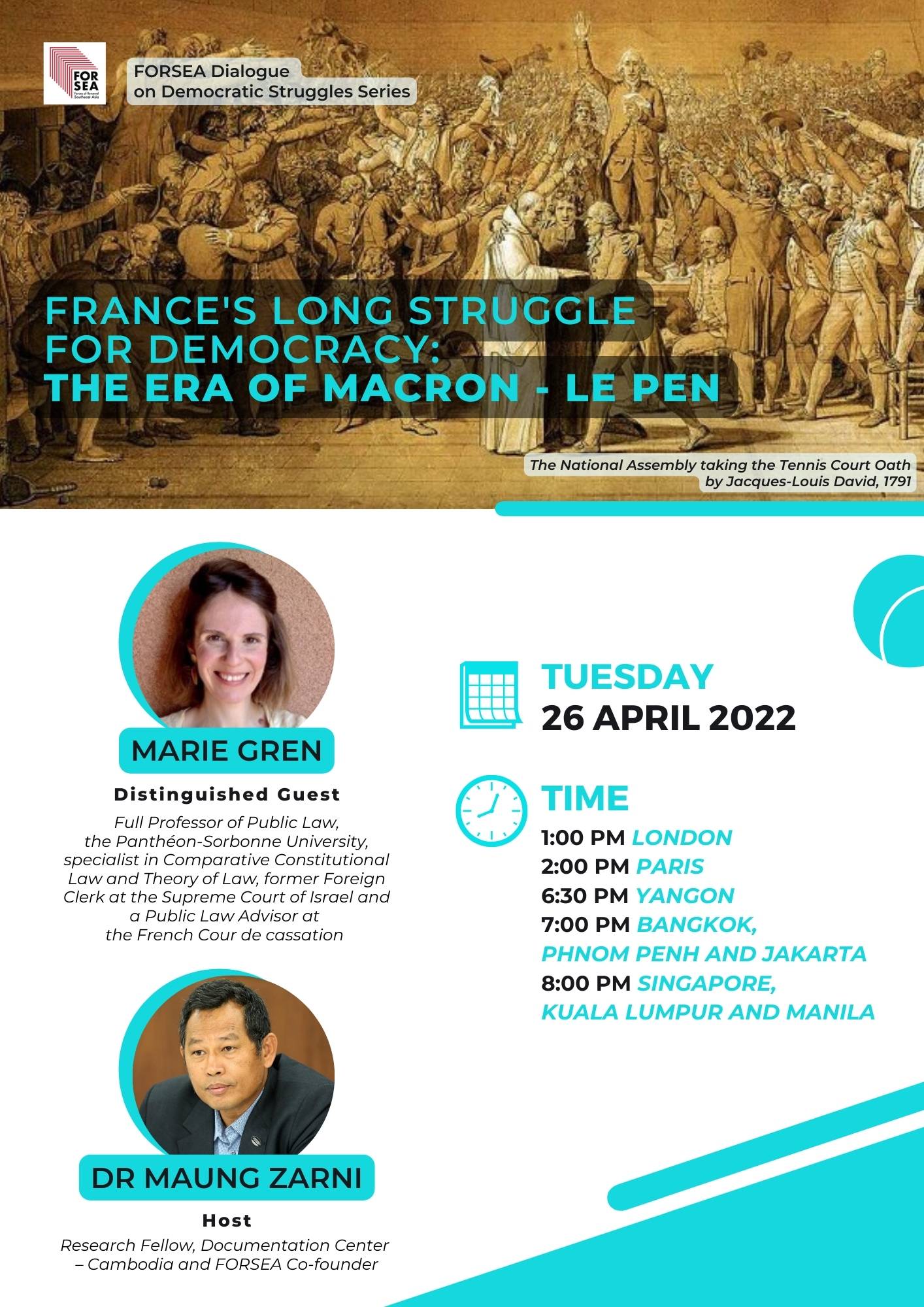On 24 April France is holding a run-off election between two deeply divisive politicians, both Right Wingers – the incumbent President Emmanuel Marcon (44) and the ultra-nationalist challenger Marie Le Pen (58).
A young French journalist who has covered the “Yellow Vest” movement characterised the run-off as a contest of unpopularity. That is, French voters are casting their vote against the candidate they hate more. While concerned about Le Pen’s loathsome Islamophobia and resurgent white French nationalism, many left-leaning young voters do not seem to be prepared to vote for Macron – whom they consider a typical banker who lives in the world of the rich and does nothing for the vast labouring classes.
After his election in 2017, Macron has failed to deliver on his numerous campaign promises. Steep consumer price hikes (particular fuel prices) and pro-corporate/employer changes to France’s employment and labour laws, among other things, had triggered massive weekly protests and riots across France, having given rise to a powerful “Yellow Vest” movement to oust Macron.
FORSEA Dialogue Series on Democratic Struggles is hosting a public discussion with a constitutional law scholar and a student of French politics Professor Marie Gren of Sorbonne on 26 April.
-
- Is Marcon-Le Penn’s run-off a worrying sign that a significant segment of the French electorate are embracing populist, right wing ideas (anti- minority strain of French nationalism, anti-refugees, anti-European Union and so on?)
- Macron has been portrayed in western media as EU’s “Golden Boy” promoting neo-liberal ideas that hurt working classes at home (as evidenced in the Yellow Vest protest movement). Meanwhile he was also expressing and explicitly culturally colonial or imperialist views towards Africa and Muslims of France (the largest Muslim population within the EU). Does Macron’s re-election mean more of the same, although he attempted to woo France’s Muslim voters back during the election campaign?
- Who is “French” in the eyes of both mainstream and nationalist voters? How much influence does this “French-identity” culturalist/ideological politics and the idea of a (French Nation-state) play in today’s politics?
- Have the ideals of French Revolution – equality, fraternity and liberty – ever been realized within the French constitutional democracy?
- While very popular with the young generation French, the socialist candidate and Mayor of Paris Anne Hidalgo did not do very well – although she seemed to embody these egalitarian values and inclusivity. What accounts for her failure to capture the French votes?
See who is who in the French Election of 2022: https://www.euronews.com/my-europe/2022/04/11/french-presidential-election-who-s-who-in-the-race-to-replace-macron
Watch LIVE: THURSDAY 7 APRIL, 2022
1 pm (GMT/London) | 2 pm Paris | 6:30 pm Yangon | 7 pm Bangkok | 8 pm Singapore, Kuala Lumpur & Manila
L I V E

Marie Gren is a Full Professor of Public Law at the Panthéon-Sorbonne University.

Marie Gren
She specializes in Comparative Constitutional Law and Theory of Law. She has taught in various fields of public law in French and in English. She has been a visiting Researcher at the University of Tel-Aviv (2013) and Columbia University (2014) and an Erasmus Scholar at the Jagiellonian University in Krakow (2022). She has worked as a Foreign Clerk at the Israeli Supreme Court and as a Public Law Advisor at the French Cour de cassation. She speaks fluent French, Polish and English and has good notions of Hebrew and Russian. Her research is focused mainly on constitutional transformations. She also works on prisons and constitutional education.
She wrote a book (PhD published in 2019) which deals with shift of Constitutional Paradigms, akin to the scientific revolutions described by Thomas Kuhn. The case study of this theoretical analysis is the progressive transformation of French, British and Israeli systems towards a greater preeminence of constitutional norms, under the joint efforts of judges and legal scholars. She wrote several articles on the democratic quest of the Israeli Supreme Court (2017, 2019) and its Americanization (2014). She wrote on the implicit constitutionalism at work in the United Kingdom through the Miller I case (2017) and has analyzed the constitutional shift of paradigm in Poland towards illiberal democracy, through the length of “state reputation” (2019) and nationalistic democracy (forthcoming). She pondered on a possible Frexit (2017) and produced a general analysis of the role of judges at Supreme and Constitutional Law Courts for the Max Planck Encyclopedia of comparative constitutional law (forthcoming). She currently works on the Chilean Constitutional Assembly and on a general overview of the transformation of legal traditions in the world (questionnaire online).
She has analyzed several aspects of prisons’ constitutional framework: prison privatization in Israel (2011), disciplinary powers of the prison governors in France and the United Kingdom (2014) and the use of constitutional judicial review mechanism (QPC) by prisoners in France (2020).
She has written on the importance of teaching implicit legal habits to French Law students in order to foster social equality (2015). She currently works on a review of Constitutional Revolution (G. Jacobsohn, Y. Roznai) focusing on the notion of constitutional education. She has several ongoing projects in the field of constitutional education: a book chapter, a case-study of a democratic school in Poland (paper for the World Congress of Constitutional Law in Johannesburg) and an article in French on comparative constitutional education.

